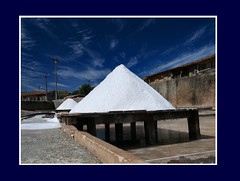 Salt (Photo credit: dynamosquito)
Salt (Photo credit: dynamosquito)How bad is salt for you? Doctors recommend limiting salt intake for a variety of reasons: from cardiovascular disease and hypertension, to avoiding weight gain. This is particularly true for African Americans who doctors recommend taking less than 2 grams/day due to the increased risk of hypertension.
But are all salt created equal? It is true that it is necessary to be aware of how much sodium you take in, but are all salts equally bad?
This post will consider some of the information regarding refined and natural salt.
Unrefined salt
Unrefined salt is important in many bodily functions. Natural salt is 84% sodium chloride and includes trace minerals such as silicon, phosphorus and vanadium.
Unlike the processed salt, natural salts aids the body in regulating the blood pressure, helps maintain the acid-base balance, contains sodium which is necessary for the firing of neurons. Helps support the adrenal glands which produces numerous important hormones. It also helps the muscles communicate with the body's muscles, which helps you move about freely.
Processed salt
Processed salt is 97% sodium chloride and includes chemicals that aid in helping the salt flow freely and moisture abosrbents. Usually processed salt has iodine added to it as well.
In the preparation of processed salt, it has been heated to high temperatures which alters the chemical structure and makes it a health risk. And, since processed salt is high in sodium chloride, water is needed to neutralize it, which contributes to:
weight gain
cellulite
arthritis, rheumatism and gout
kidney and gall bladder stones
hypertension
Just think, you get numerous problems from a nutritionally void substance.
Alternatives
Sea salt, is an example of a healthier salt which has additional nutrients as mentioned that processed salt doesn't have to help in maintaining health. Be moderate in use though, since as all good things overdoing it could cause problems as well. Because it contains sodium chloride, although less than processed salt, it can still cause similar cardiovascular and weight problems if consumed in excess.
source:
"The guilty pleasure that could save you from heart disease" www.mercola.com

No comments:
Post a Comment